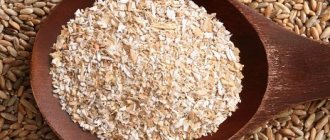In the modern world, eating healthy and regularly is difficult. People are highly active, are in a hustle and bustle and worry, so minimal time per day is allocated for food. As a result, metabolic processes slow down, the body does not receive enough useful components and vitamins, and the intestines experience malfunctions. To eliminate this problem, you need functional nutrition, which will make up for the deficiency of essential vitamins, minerals and components for optimal and coordinated work, as well as weight loss.
What is functional nutrition?
Functional nutrition is nutrition with certain foods (which ones - read on), which contain amino acids, lipids, slow carbohydrates, fat- and water-soluble vitamins, minerals necessary for the body at the biochemical level.
Turning to the fundamental work of Konstantin Monastyrsky, who researched and described the phenomenon of functional nutrition, we find the following words:
... this is nutrition that gives the body everything it needs and does not give anything that harms it. (K. Monastyrsky, “Fundamentals of absolute health and longevity. Functional nutrition”)
The supply of key nutrients to the body ensures the full functioning of biochemical systems at the cellular level, thanks to which functional nutrition not only helps to lose weight, but also improves health and prolongs life.
The functional style of nutrition is maximally adapted to the biochemical needs of the body for systematic self-renewal. (K. Monastyrsky, “Fundamentals of absolute health and longevity. Functional nutrition”)
The functional nutrition system is aimed at solving the following main problems of modern overweight people:
- Poor nutrition. The problem is caused by an active rhythm of life, a busy schedule, frequent fast food snacks, and access to fatty and fried foods on every corner. If you include functional nutrition in your life, you will develop the habit of choosing the right foods that are beneficial for every cell of the human body;
- Eating low quality food. Modern food consists of a large number of dyes, preservatives, and flavorings. Such foods do not saturate the body, but only temporarily smooth out the feeling of hunger, which returns again after a few hours. Functional nutrition promotes the consumption of organic, environmentally friendly products, devoid (as far as possible) of chemical components, as if returning a person to a primitive time when taste enhancers did not exist;
- Presence of diseases. Obesity (for reasons of functional nutrition) occurs due to insufficient activity of the digestive system, lack of a sufficient amount of essential microelements, amino acids, vitamins, and so on in the diet. Often the functioning of the gastrointestinal tract is disrupted due to illnesses. In the forefront are gastritis, ulcers, pancreatitis, diseases of the bile production and excretion system (cholecystitis, cholelithiasis, acholia, and so on), and other diseases.
If you normalize your diet, you will not only lose extra pounds, but also improve your health, restore impaired functions of the gastrointestinal tract, and prolong your youth.
Tea
A product that is in the diet of almost every modern person. Tea is also functional: green tea is considered the most useful. When consumed regularly, the drink helps:
- Maintain youthful and healthy skin.
- Maintain high energy levels throughout the day.
- Reduce the risk of myocardial infarction.
- Get rid of excess weight.
- Clean the vessels.
- Reduce pressure.
- Improve mood.
- Slow down aging.
The main condition is that the tea must be freshly brewed; after it has cooled or the next day after brewing, it is useless to drink it. In addition, it is not recommended to drink more than four cups of the drink and drink it in the late afternoon. High caffeine content will keep you from falling asleep. As for black tea, it is considered a little less healthy, although it has a gentler effect on the body. Other varieties of the drink also have certain beneficial properties: white, red, herbal.
Advantages and disadvantages
Functional nutrition for weight loss has only advantages; there are simply no disadvantages to following it. Among the advantages are noted:
- Normalization of metabolic processes;
- Removal of toxins and waste;
- Improving the functioning of the gastrointestinal tract;
- Strengthening immunity;
- Rejuvenating effect;
- Available at any age;
- Diet variety.
The advantage of a functional eating style... is precisely that it is not a restrictive diet, but a set of natural long-term measures to eliminate the physiological causes of disease and early aging: excess carbohydrates, hyperinsulinism, gastrointestinal disorders, depression, chronic deficiency of essential proteins, fats and minerals. (K. Monastyrsky, “Fundamentals of absolute health and longevity. Functional nutrition”)
This diet is not a strict diet, it is easily tolerated, and allows you to change eating habits that will only benefit your health and optimal functioning. The main thing is to follow it regularly and not to do cheat meals, which in this case are not at all appropriate. Over time, the body will adapt to eating healthy foods and will no longer create the need to choose unhealthy and toxic foods.
Linoleic acid
Belongs to the omega-6 group. The general name of the substance is vitamin F, but it includes a whole complex of useful microelements. Linoleic acid also contains vitamins D, E, K, A. At the same time, it serves as a valuable source of energy and does not affect fat gain, therefore it is used for weight loss. Additional beneficial properties of CLA (conjugated linoleic acid) are:
- normalization of blood pressure in hypertensive patients;
- reduction of body fat in adults;
- improvement of the respiratory tract in asthma and allergic reactions.
Functional nutrition by Konstantin Monastyrsky
Konstantin Monastyrsky is a consultant nutritionist who introduces modern people to functional nutrition. He wrote several books on this topic and developed functional nutrition, which became accessible to every person.
Monastyrsky came to functional nutrition after he himself was faced with obesity and diabetes. He showed by personal example that you can overcome any problems with the help of nutrition, following the principles.
Principles of functional nutrition by Konstantin Monastyrsky:
- Refusal of fruits and vegetables with a lot of fiber and carbohydrates (grapes, apples, bananas, cauliflower, broccoli, peas, beans, lentils). Due to the large amount of fiber that enters the body with foods, the intestinal mucosa is damaged and gastrointestinal disorders occur. Monastyrsky recommends eating only fresh vegetables;
- Refusal of grain and flour products with high levels of carbohydrates (bread, cereals, pastries, sweets). They help increase insulin levels, which converts carbohydrates into fat;
- The diet should be based on fermented milk products and meat (as on protein diets). These products contain the necessary vitamins, amino acids, lipids, micro-, macro-, ultra-microelements.
Monastyrsky recommends adhering to these principles throughout your life, and not just when you need to lose weight or get rid of a particular disease. In addition to these key features, Konstantin emphasizes the following:
- Functional teeth. It is necessary to maintain the health of the oral cavity, since only effective chewing contributes to the enjoyment of food and the primary fermentation of foods already in the oral cavity;
- It is necessary to separate protein and carbohydrate meals. Proteins and carbohydrates cannot be fermented in the gastrointestinal tract at the same time. Consuming these nutrients together will not allow the body to absorb either proteins or carbohydrates;
- Eat fats. Many people try to lose weight on “fat-free” foods, not realizing that they are harming the body. Lipids are necessary for the functioning of the gastrointestinal tract; they are substrates for the synthesis of hormones of the gonads and adrenal glands; without them, fat-soluble vitamins cannot be absorbed. You can get fats from vegetable oils, plant seeds, sour cream, cream, lard;
- Consume fermented milk products, not milk. Cow's milk is intended for calves and is “tailored” to their needs. The beneficial substances from it are not absorbed by the human body, and milk sugar is harmful to health. Fermented milk products are absorbed much faster and easier by the human body and bring noticeable benefits;
- Stop chewing gum and smoking. These products stimulate the production of saliva and gastric juice, which provokes gastritis and heartburn;
- Don't be afraid of nutritional supplements. Functional nutrition emphasizes that it is impossible to get everything the body needs from food. You should select, in consultation with a nutritionist, a multivitamin and multimineral preparation for daily use;
- It is necessary to use organic food, in which the amount of antibiotics, herbicides, pesticides, and so on is reduced to zero. These substances destroy our symbiotic flora in the intestines, which disrupts digestion;
- Drink water whenever you want. There is no need to drink 1.5-2-3 liters of water per day. The diet and lifestyle of modern people favor much less water consumption, so there is no need for large volumes.
How have Russian consumers changed over 15 years and why are they now interested in superfoods?
Interest in functional products is associated with the actively growing trend for a healthy lifestyle. According to RBC Research, in Russia this trend has received an impetus since 2003 along with the “boom” in fitness clubs and sports. Since 2012, the food sector has also joined the wave of general recovery. Consumers have become actively interested in products that help maintain the health of the body. “Islands” with healthy food appeared in retail chains, and manufacturers began to respond to the growing interest by expanding the range of the category.
According to a survey conducted by RBC, 51% of respondents or 13 million Russians go in for sports, 65% of respondents indicated that they always pay attention to healthy products in stores and monitor their composition.
The interest of Russian consumers in functional products is also determined by the formed demand for “convenience”. Shoppers often do not have time for a full meal, for example, 62% of Nielsen study participants indicated that they often eat snacks for breakfast, and 53% noted that they snack on the go during the day in order to replenish energy. These trends determine the appearance of new products; traditional formats of large bottles and packs are becoming a thing of the past, replaced by convenient packaging that is easy to take with you.
Rules and principles
The main rule of functional nutrition is the use of high-quality foods with high energy value. They should saturate the body, suppress hunger, without causing food allergies and other side effects.
Professor Gorelov highlights the following principles on which functional nutrition is based:
- Presence of probiotics. To regulate intestinal microflora, it is necessary to take kefir with bifidobacteria. The functioning of the intestines will be improved, the body will be able to receive only benefits from the products;
- River and sea products. It is necessary to create at least 2-3 fish days per week. Fish allows you to saturate the body with essential amino acids, as well as phosphorus. It improves brain function, strengthens the immune system, helps to be healthy and strong;
- Meat, fish, eggs, poultry, dairy products - these are the main components from which you need to form your diet.
Permitted and prohibited products
Functional foods are not just high-quality products that relate to proper nutrition, they are products grown exclusively in a clean environment in which there are no additives. Functional foods are those that have been scientifically proven to benefit the body and deserve to be the best.
Functional nutrition is based on environmentally friendly (organic) products that have undergone minimal processing, without preservatives, dyes, flavoring additives, antibiotics, pesticides and herbicides that contribute to the occurrence of allergic reactions and malignant tumors. (K. Monastyrsky, “Fundamentals of absolute health and longevity. Functional nutrition”)
There are functional nutrition products that are divided into groups:
- Meat (pork, beef, rabbit, etc. The most important thing is to know for sure that no antibiotics, hormones, or growth stimulants were introduced into the diet when raising animals);
- Fish (sea, river, ocean. You should avoid fish that is raised on farms - salmon, dorado, carp, pangasius, telapia. When growing these fish in artificial conditions, growth accelerators and antibiotics are used. When choosing raw fish, give preference to those that are characteristic for your region. From frozen fish, it is better to choose herring, hake, pollock, saury, sardine - they are not artificially grown);
- Poultry (domestic chickens, ducks, geese, quails, turkeys are suitable. The rule is the same as when choosing meat - it is important to be 100% sure that the birds were raised without hormones, antibiotics, etc.);
- Bird eggs (chicken, quail);
- Kefir, curdled milk, yogurt, cream, sour cream, butter and cheeses;
- Vegetables and fruits (except prohibited ones).
These products must be present in food during functional nutrition. It is advisable to include small quantities of foods from each group in your diet every day, adjusting to your daily calorie intake. They allow the body to be saturated with useful components, will be able to normalize the functioning of the digestive system, and will normalize all disrupted processes.
As for prohibited products, it is strictly forbidden to consume:
- Instant and ground coffee (these products contain rancid oils that negatively affect the walls of blood vessels. Regular consumption of low-quality coffee is one of the superfactors of early atherosclerosis);
- Ice cream (whipped sugar and fats of unknown origin are bad for the health of the liver and pancreas);
- Bread, rolls (the so-called “dietary varieties” are especially dangerous - bread, rolls with bran, rye. They affect the contents of the intestines in the same way as yeast affects dough. Speaking of white bread, it is obvious that it is a source of unnecessary fast carbohydrates);
- Porridges and cereals (although many diets promote the consumption of cereals, this should not be done. They also contain carbohydrates in much larger quantities than we need);
- Chocolate, cocoa, sweets, sugar, honey, jam (needless to say, there is a lot of sugar in these products, and the composition of sweets is often reliably unknown);
- Products with unknown components in their composition (any incomprehensible word that you have not encountered before is a reason to refuse the product);
- Packaged and homemade juices (both homemade and industrial juices contain an unusually large amount of sugar, and due to processing they lose almost all vitamins due to oxidation);
- Spread cheese and mozzarella (these types of cheese are unfermented accumulations of milk proteins, which are strong allergens and are practically not digestible by the human body);
- Margarine, butter substitutes (these products are often obtained by artificial hydrogenation of vegetable fats; they are not related to dairy products. Low-quality vegetable fats negatively affect the walls of blood vessels);
- Monosodium glutamate (included in cheap food products. It provokes migraines, negatively affects the heart, as it contains Sodium ions);
- Sausages, frankfurters, sausages (these products are made from low-grade animal raw materials at best. The color of the “meat” is achieved due to nitrates, and the taste of the sausage is achieved by salt, spices, flavor enhancers, monosodium glutamate);
- Veal, broilers, chickens (industrial chicken and veal are some of the most contaminated foods with antibiotics, hormones and growth accelerators. Speaking of chickens, it is not difficult to tell the difference between “organic” home-raised chicken and broiler chicken. Domestic chickens are usually lean, muscular , cyanotic, because during life they moved actively, unlike broilers, which live in cages; they ate natural food);
- Vintage wines (wine contains sulfites, which act as preservatives. They first provoke rapid dilation of blood vessels, and after a while they narrow, resulting in headaches. Fortunately, many producers have begun to produce organic wines labeled “Contains sulfites”, which indicates the presence of only sulfites naturally formed during the fermentation of grapes in the product);
- Products containing tyramine (tyramine is an amino acid found in canned fish, mature hard cheeses, smoked and dried meats, and pickles. Tyramine provokes migraines);
- Diet drinks (saccharine and aspartine are carcinogenic factors, which also increase the concentration of insulin in the blood);
- Dried fruits (store-bought dried fruits do not contain vitamins and are processed with numerous preservatives and syrups. If you want dried fruits, prepare them yourself using dehydrators for vegetables and fruits);
- Cauliflower, broccoli, peas, beans, lentils (contain much more fiber than a person needs).
Also, functional nutrition presupposes a category of foods that can be consumed, but this is not advisable. These include vegetable fats - olive, sunflower, corn, flaxseed. You can consume them as they contain omega-3 fatty acid (essential).
However, studies show that these oils do not supply the body with cholesterol (a substrate for the synthesis of hormones of the sex glands and adrenal glands, the formation of lipoproteins), phospholipids for the construction of cell membranes. In addition, during industrial processing, carcinogens are formed in oils, and when frying, their amount only increases. Therefore, if you want to consume vegetable oils, do so only in their raw form.
Who produces new generation products in Russia
Despite the fact that the trend for better-for-you products in Russia is still just at the beginning, Nielsen experts note, many companies are already trying to adapt it. Herbal formulations are particularly successful. According to analysts, the share of plant products on the Russian market is 0.2% (11 thousand tons). By 2029 it will reach 10.7% (664 thousand tons).
In the segment of herbal products, the functional category in Russia is being developed by Danone, which owns the Alpro brand. Drinks, plant-based yoghurts and desserts under the brand are enriched with vitamins B1, B12 and D. In 2021, Pridonya Gardens introduced plant-based alternatives to dairy products with the addition of B vitamins to the Russian market. One of the most popular functional food products is a spread that contains dairy and vegetable or only vegetable fats. A balanced fatty acid composition, the absence or minimal amount of cholesterol and trans-isomers, and the possibility of enrichment with functional food ingredients make the spread a product for a healthy diet.
EFKO Group of Companies at the XVII All-Russian Congress on Nutrition and Dietetics and the II Business Forum “Development of the production of specialized food products - a new format for interaction between industry and medicine” presented products with a given composition using vegetable oils and fats. The recipes were developed within the framework of the comprehensive scientific research plan (CPRP) of the Federal Research Center for Nutrition and Biotechnology. Experts and guests of the events tasted bread with an increased content of B vitamins and dietary fiber, a spread with vitamin E and phytosterols, a pasta with a high protein content and an optimal combination of milk and vegetable proteins, a dairy-free drink based on oats and oat bran, which can be recommended to people leading a healthy lifestyle and controlling their weight.
According to the head of the laboratory of food biotechnologies and specialized products at the Federal Research Center for Nutrition and Biotechnology, Professor Alla Kochetkova, “new generation products with specified quality characteristics are designed to meet individual human needs for nutrients and energy, taking into account the characteristics of his metabolism, food preferences, as well as prognostic risks of possible health problems or the development of diseases of a nutritional nature. Such a source of essential nutrients can be fatty products with a given composition, enriched with fat-soluble vitamins, polyunsaturated fatty acids, minerals and other micronutrients.”
Where to buy quality products?
When switching to functional nutrition, many people wonder where to buy products so that they meet all standards and requirements. If you have a summer house or plot of land, you need to grow most of your food there. In this case, there will be complete confidence that the products are of high quality, healthy and without various additives.
Unfortunately, there are no products on the shelves of stores in our country with a mark that they are “functional”. You can find the most environmentally friendly products in eco-markets and specialized stores for vegans and vegetarians, raw foodists and fans of other unusual food practices. There is no meat or dairy there, but you will most likely be able to choose fruits and vegetables, additives.
It is better to buy fish, poultry, eggs, dairy and meat from one trusted farmer who inspires trust and has a large flow of regular customers. Before purchasing, you need to ask whether the products were chemically treated, what fertilizers were used during the growing process, and what and how the animals were fed. It is imperative to get an answer to these questions, because it only depends on it whether these products will bring benefits to the body.
How do functional foods replace medications?
The category of functional products, or better-for-you, is a new generation of products with added benefits for the body - they have an increased concentration of nutrients, such as vitamins, minerals and proteins. Such products have become a response to the current consumer request - the desire to take care of oneself without the use of pills and dietary supplements. Each of these products solves specific health problems. For example, protein shakes, yoghurts, snacks - restore muscles, spreads with vitamins A and D - support the health of the heart and blood vessels.
Some functional products are developed for specific consumer groups with specific physiological needs: lactose-free dairy products for people intolerant, confectionery products based on sugar substitutes for diabetics. However, most of the products are aimed at all buyers who are simply tired of the traditional supermarket line and are looking for interesting and healthy options - for example, sugar-free ice cream or desserts with reduced calories.










